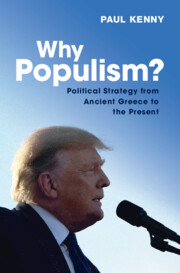Book contents
4 - Democracy’s Children
Published online by Cambridge University Press: 17 March 2023
Summary
Taking up the cases of America and France in the middle third of the nineteenth century, this chapter demonstrates that long-term changes to the organization of a society – demographic growth, territorial expansion, industrialization, etc. – affect the relative costs and benefits of different political strategies. With America’s expansion west and south in the early nineteenth century, millions of new voters, only weakly attached to existing political parties, were available for mobilization. Andrew Jackson took advantage, combining the use of patronage and populism to become the first outsider to win the presidency. In France, political participation remained highly constrained in the wake of the monarchical restorations of the early nineteenth century. When the Orléanist monarchy was overthrown in 1848, Louis Napoleon used his illustrious name to win elections for the new office of president. With Jackson’s administration, a new, more expansive spoils system was introduced. Allegiance to the Democratic and Whig parties was almost total, rendering direct populist mobilization of the masses an unlikely route to power. The populist strategy in America began instead to be aimed at winning the leadership of a mass party.
Keywords
- Type
- Chapter
- Information
- Why Populism?Political Strategy from Ancient Greece to the Present, pp. 92 - 131Publisher: Cambridge University PressPrint publication year: 2023

